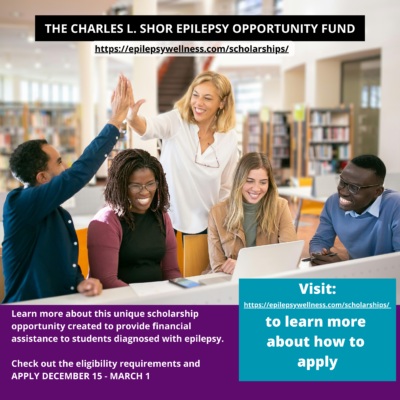
This summer marks my final days as a student! For now, that is. I have completed my Master’s degree and I have to say, it feels wonderful. I have a passion for school but after spending over 20 years studying, I am thankful to have a break.
Anyone with Epilepsy knows that school can present a number of challenges, including people who think that individuals with this diagnosis cannot achieve higher education. I’m here to tell you that you can get that advanced degree, and offer some helpful tips for your journey.
Do Your Research
What do you need in a school? Typically, when looking at colleges, we’re told to look at the programs we’re interested in, what clubs we may want to join, and what various housing options are. These are all key parts of the collegiate experience!
As an individual with Epilepsy, I also had to look at other parts of college towns. How close am I to a hospital and pharmacy? What is the medical care like on campus? One of the most important parts of my undergraduate experience was the care I received by the campus medical center. Never underestimate the importance and necessity, but sometimes dearth of knowledgeable professionals on a college campus.
Another service I used frequently was the disability support center (DSC). How accessible are the disability support services and personnel when you need accommodations for classes? These features of a college can create a positive and successful experience for you. These features can apply to both undergraduate and graduate degrees. I researched and used nearly all of these services throughout my post-high school days; some were more crucial than others but all were an integral part of my success.
I’m on campus…now what?
Okay, so you’ve made it to school, you’ve moved in to your apartment or dorm, and you’re ready to begin classes. As a student, it is important to learn the buildings, become friends with your roommate if you aren’t already, and explore what the campus has to offer. As a student with Epilepsy, there are additional steps. Make an appointment with the disability support center staff and discuss potential accommodations. Be sure to bring any paperwork requested to this meeting, as it may be needed to put your accommodations into place.
Even if you do not need these modifications, the staff can be very helpful when deciding how/when to tell your professors about your Epilepsy, which professors are more sensitive to those with disabilities, and assistance in allocating your time so you’re not exhausted from all the activities that college has to offer. I could go on for days about how the DSC has helped me! Locate pharmacies that are close to you and maybe even introduce yourself to the pharmacists. In my experience, pharmacists and employees are so personable and even more helpful when you have a personal connection with them.
Potential Problems
Of course, the road is not always sunny. Sometimes we run into problems. A professor might be boring or unkind, a class might prove to be more difficult than you imagined, or you may experience medical issues while at school. Don’t panic. Use your resources. If you have accommodations, see if you can use them in your class. Maybe you’re able to record the professor while he/she gives a lecture, and be able to listen back while studying, instead of trying to rapidly write his words. Ask if an extension can be given on an assignment. You may have to work harder than others in your class. That’s okay!
I had to find creative ways to study because I had to spend so much extra time doing so. Finding ways to study that worked for me made my time in school easier and allowed me to be successful. Consult with your doctors to determine what treatment is best for any medical problems. Be patient if professors or peers are not understanding with you bring up your Epilepsy. Not everyone is informed about seizures! Use this time to educate to lessen the stigma they have.
Your Advanced Degree
Collegiate life has been one of the most exciting and trying experiences thus far. Epilepsy didn’t make it easier but I did learn a different perspective on the entire experience. Just because you have a diagnosis does not mean you cannot achieve great things! You have the ability to do whatever you want as long as you work hard and use your resources wisely.
As a girl, my parents were told not to expect me to go to college. I’m proud to have proven that theory wrong.
Do you have questions about achievement with Epilepsy in undergraduate or graduate school? Drop me a line in the comments!









Leave a Reply